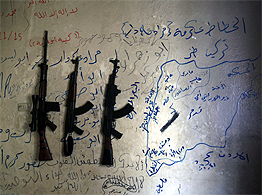 | « Back to article | Print this article |
 Syrian President Bashar al-Assad has crossed a ‘red line’ by using chemical weapons in the strife-torn country, prompting the Unites States to send military support to rebels for the first time, a top American official has said.
Syrian President Bashar al-Assad has crossed a ‘red line’ by using chemical weapons in the strife-torn country, prompting the Unites States to send military support to rebels for the first time, a top American official has said.
"Our intelligence community assesses that the Assad regime has used chemical weapons, including the nerve agent Sarin, on a small scale against the opposition multiple times in the last year," said Deputy National Security Advisor Ben Rhodes.
"The intelligence community estimates that 100 to 150 people have died from detected chemical weapons attacks in Syria to date; however the casualty data is likely to be incomplete," he said on Thursday.
Rhodes said while the lethality of these attacks make up only a small portion of the catastrophic loss of life in Syria, which now stands at more than 90,000 deaths, the use of chemical weapons violates international norms and crosses 'clear red lines'.
"We believe that the Assad regime maintains control of these weapons. We have no reliable, corroborated reporting to indicate that the opposition in Syria has acquired or used chemical weapons," he said, adding the US would be consulting its international partners and members of the Congress in this regard.
President Barack Obama, he said, has been clear that the use of chemical weapons -- or the transfer of chemical weapons to terrorist groups -- is a red line for the United States, as there has long been an established norm within the international community against the use of chemical weapons.
"The president has made a decision about providing more support to the opposition, that will involve providing direct support to the (Supreme Military Council), which includes military support," Rhodes said.
"Put simply, the Assad regime should know that its actions have led us to increase the scope and scale of assistance that we provide to the opposition, including direct support to the (rebel Supreme Military Council). These efforts will increase going forward," Rhodes' statement said.
Noting that the US and the international community have a number of other legal, financial, diplomatic, and military responses available, Rhodes said the US is prepared for all contingencies, and will make decisions on its own timeline.
"We cannot afford to delay any longer. We must take more decisive actions now to turn the tide of the conflict in Syria," said Senators John McCain and Lindsey Graham.
Image: Three weapons hang on a wall depicting a map of Syria in a safe house of Martyr Al-Abbas, a rebel group, in Aleppo | Photograph: Muzaffar Salman/Reuters